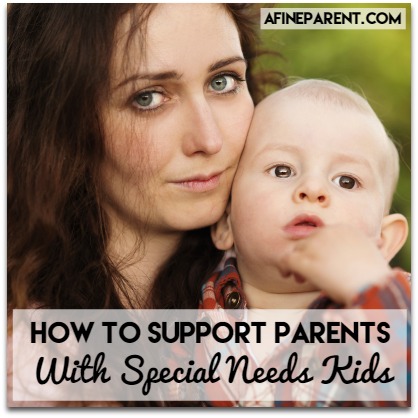 Do you feel tongue tied when you meet parents with special needs kids? Are you worried that you might say or do the “wrong” things?
Do you feel tongue tied when you meet parents with special needs kids? Are you worried that you might say or do the “wrong” things?
As the mother of a child with autism, I’ve seen a lot of people in your situation. And even though most mean well, sometimes friends and family do end up with their foot in their mouth.
My son Addy was diagnosed with an autism spectrum disorder about one year ago. I remember sitting in that doctor’s office, twisting a Kleenex in my hands to calm my nerves, feeling terrified to hear her say the words I knew were coming.
That day feels like a lifetime ago. The process of getting a diagnosis and taking the next steps was at times overwhelming, and it was an adjustment that took time not only for me, but for those closest to me as well.
Through mostly a process of trial and error, my friends, close family, and extended loved ones no longer worry so much about what to say or do when it comes to Addy. His autism is merely another part of what makes him who he is, much like his love of Thomas the Tank Engine and grilled cheese sandwiches.
According to CDC, 1 in 68 children is identified with Autism Spectrum Disorder. Today, I’d like to share with you, the best I can, what it is like to be the parent of a special needs child, and what you can do to support that parent in your life with a child like mine.
#1 Don’t ignore their concerns in the beginning
 Addy was my first child. Born in the summer between what was to be my final two semesters of college, he was at once everything I feared and everything I dreamt of one day having.
Addy was my first child. Born in the summer between what was to be my final two semesters of college, he was at once everything I feared and everything I dreamt of one day having.
As the story usually goes, life had its fair share of surprises in store for me, the first of which presented itself not long after I’d begun to feel comfortable, if not confident, in my ability to thrive as a single parent.
Addy was particularly quiet as a baby, opting to communicate with his body rather than with sounds – when he chose to communicate at all. By the time he was nearly 18 months old, he was still largely non-verbal, and getting even the shortest bit of eye contact from him felt like a losing battle every time.
Whenever I tried to bring up my concerns with those closest to me – and more experienced – I was always met with the same reaction: he’ll talk when he’s ready. I’m sure everything’s fine.
Even though I knew that they were trying to help, I wanted to shake them. I wanted to scream.
No, everything isn’t fine!
When interacting with parents who may suspect that their child has special needs, it may feel natural to assure them that everything is okay. It may feel like you’re helping them, offering comfort by denying the mere possibility, and while it’s true that some may be looking for someone to assuage their fears, some of us just want what we see with our own eyes validated.
If you’re sensing that they want someone to acknowledge their concerns, here’s what you can do: use that opportunity to change the tone of the conversation. Finding out that your child has special needs does not need to be approached as if it’s the end of the world. Assure them that, even if that is the case, everything will still be ok.
Help them find ways to be proactive with their concerns, rather than just trying to hand-wave them away. It takes courage to get to that point, and that courage should be commended.
#2 Maintain a positive attitude
 That day in the doctor’s office, I thought that hearing her say the actual words (“Yes, Addy does have an autism spectrum disorder”) would destroy me. But, after all was said and done, I felt an immense rush of relief.
That day in the doctor’s office, I thought that hearing her say the actual words (“Yes, Addy does have an autism spectrum disorder”) would destroy me. But, after all was said and done, I felt an immense rush of relief.
Of course, once I got back home and everything really sunk in, it wasn’t long before I got to worrying again. But, in that moment, I felt as if I could finally stop wondering about the ‘what if’ and instead we could move forward.
I gave myself that time to cry and to feel fully whatever came, and it’s ok if you need to do the same, even if it isn’t your child. Maybe it’s your grandchild, or nephew. ‘Working through it’ for yourself in this way puts less pressure on the parent you’re trying to support. I couldn’t walk each and every person close to me through the process of acceptance I went through; I didn’t have the emotional energy left over.
A diagnosis isn’t a death sentence. I view it as the gate through which parents of special needs children can walk through in order to start moving toward a better life for their child, one in which they’re equipped with the tools needed to help them fulfill their potential.
But after all this time, I still forget that. Sometimes it does feel like a death sentence, like I have to say goodbye to everything I wanted for my child. There are times when I still get lost in the guilt and the hopelessness, wondering time and time again if it was something that I did (even though I know that it doesn’t work like that), feeling anxious about what the future will be like for my son (no one knows, just like with any child).
At times like those, I needed the people around me to help lift me back up again. My sister was that person for me, always there to remind me of all the good things to look forward to, of all the progress we’d already made.
If you’re close to a parent who has a child with special needs, be that person in their life who seems to keep a tally of every single thing they have to be happy and optimistic about and can recite it back on command.
Having people there to share in my optimism when it came to our next steps (like therapy and early intervention programs), to celebrate our good days and soothe us on the bad days, has made all the difference in my life.
#3 Do your research
 Before Addy, autism was a hazy, unfamiliar concept to my family, just a word associated with charity walks. It was distant, something that didn’t really exist in our world. I’m not proud to admit that, but it’s the truth.
Before Addy, autism was a hazy, unfamiliar concept to my family, just a word associated with charity walks. It was distant, something that didn’t really exist in our world. I’m not proud to admit that, but it’s the truth.
I like to think that I’ve come a long way. I know now that autism isn’t just a quiet kid in a movie who’s really into trains. I’ve come across a lot of definitions, but the one I usually parrot comes from the National Institute of Neurological Disorders and Stroke:
Autism spectrum disorder (ASD) is a range of complex neurodevelopment disorders, characterized by social impairments, communication difficulties, and restricted, repetitive, and stereotyped patterns of behavior.
I feel like I could recite that in my sleep.
But here’s the thing: I’m not always in the mood to educate, especially if we’re having one of our more challenging days. Sometimes I feel like a broken record, wishing I could just hand out a brochure to all the aunts and uncles and distant cousins who have questions over holiday dinners.
Sometimes I’m happy to talk at about it – I’ve gotten to that place, but maybe other parents haven’t. There’s a chance that everything is still very new and intimidating for them, and they’re struggling with it. Read their body language and tone, and you’ll probably be able to tell which stage they’re in.
The first few weeks following an autism diagnosis can come with a renewed sense of hope, now that you have a name for something that felt so present in your life but which you were unable to articulate. At the same time, it can be nothing short of terrifying to feel as if you’re entering completely foreign territory with the future of the person most important to you at stake.
Look at it this way: if your niece has just been diagnosed with autism, bombarding her mother with questions like ‘So what is life going to be like for her now? Can she go to ‘regular’ school? Will she ever learn to talk?’ may just send her into the tailspin she’s been trying to avoid.
Doing your own research doesn’t mean you can’t ask questions. It just means you care enough about both the parent and child in your life to do some of the work yourself. Chances are, you may learn something they haven’t yet, or bring a fresh perspective to later conversations.
If your child is friends with a child who has special needs, doing your research can be as simple as a Google search to make sure you know the basics, and talking with the child’s parents so that you’re aware of any sensitivities you need to be aware of.
For example, some individuals with autism are extra sensitive to light and sound, and events that have too much of either may overwhelm them. You’d want to be aware of any allergies before planning a dinner party, wouldn’t you? It’s pretty much like that.
When Addy was first diagnosed, and the relief passed, I went through a period of time where I was too anxious to do much research, feeling overwhelmed by search engine listings that included words I’d never even heard before. In those days, my older sister was an invaluable resource for me. She did research on her own time and would causally drop encouraging tidbits of information into our conversations and would gauge from my reaction whether I was ready to hear more.
Having it come from a loved one who was trying to help me made everything less scary for me and helped me get over the paralyzing fear and continue moving forward, having been reminded that I didn’t have to do everything alone.
#4 Be there for them, even if you don’t yet know what to say
 There’s a lot to be said just for being there, physically. My brother went with me to every appointment during the stages of getting the diagnosis. As a single parent, I told myself that I’d be able to continue handling everything on my own, but when the time came, I was thankful just to have another adult in the car with me on the way home.
There’s a lot to be said just for being there, physically. My brother went with me to every appointment during the stages of getting the diagnosis. As a single parent, I told myself that I’d be able to continue handling everything on my own, but when the time came, I was thankful just to have another adult in the car with me on the way home.
You may not always have the right words, but you can try and be physically present for the support. We were all still learning about autism, but when my family saw the emotional toll it was taking on me (and the fact that I often looked close to having an emotional breakdown, if I’m being honest), they stepped in.
They offered to babysit, so that I could have time alone with my thoughts, uninterrupted by children’s show theme songs or insistent crying, or take the time to get out of the house (and out of my head). They cooked meals for me, to take some of the pressure off. They sent me encouraging text messages, just reminding me that we were all in this together.
Once I opened up and let them in, my family rallied around me; we were all brought together in support of my son. All of us are closer now than ever before, and that’s bemuse they made it clear, through their constant presence in my life, that they wanted to support us in whatever way they could.
#5 Be patient
 Addy and I have embraced our new normal of almost daily therapy, of beginner sign language and sensory social routines (games that encourage social interaction), but every day comes with its own challenges and rewards, and feeling optimistic one day does not guarantee that same attitude tomorrow.
Addy and I have embraced our new normal of almost daily therapy, of beginner sign language and sensory social routines (games that encourage social interaction), but every day comes with its own challenges and rewards, and feeling optimistic one day does not guarantee that same attitude tomorrow.
My son has not yet begun to use words, and it’s really hard for me sometimes to watch children who are younger than him be able to do things that we have to work so hard on in therapy. Of course, then I feel guilty for feeling that way – measuring him against the yardstick of other children’s progress- and the cycle begins.
There are days when I feel like a confident, well-adjusted parent, and then there are the days where the optimism seeps out of me like air from a punctured balloon.
The key thing to remember is that autism looks different in every individual. Some individuals with autism are nonverbal; some learn to talk just fine. Individuals with autism see the world differently than those who are not ‘on the spectrum,’ and that can manifest in skills in things like music and art.
Addy is almost three now, and doing well in therapy and the early intervention program that he’s enrolled in. Still, progress can be hard to see sometimes, and that can be discouraging. No one can really say that your child will learn how to do this or that by whatever age. All you can really do is make goals and work towards them, step by step.
When you first have children, you think they have a pretty clear-cut path they can follow – school, extracurricular activities, college. It feels like you have some sense of control over it, even if that control is an illusion.
Since Addy’s diagnosis, I’ve had to accept the fact that I really can’t guess what the future will look like for him. That’s hard to deal with sometimes – really hard.
Will he learn to talk? How long will it take? Will he be able to be independent as an adult?
We all have those days, whether you have a child with special needs or not – the unknown is just too much to handle. Sometimes I just need to vent, and say that I’m scared, and that I don’t like it.
Let me.
The 2-Minute Action Plan for Fine Parents
If you have a close friend or a family member who is raising a child with special needs, think about how you can support them. Do you view having special needs as an awkward topic (which can, in turn, make them uncomfortable)? Are you a sympathetic ear when they need it?
The Ongoing Action Plan for Fine Parents
It’s all about being accepting of those who are different from you. Think of how you can teach your children to be empathetic to special needs kids that they meet. Set aside time to talk openly and make a plan to learn and grow together as a family.
Use what you know to inform others and be an advocate for those with special needs. If you hear someone spreading a misconception about children with autism or any other special needs, engage them in conversation. I didn’t always know the things I know now, and you didn’t either. Maybe with enough of these conversations, parents can be more aware of the symptoms of autism and other disorders, and the process of getting help won’t be as stigmatized or as intimidating.
I have the good opportunity that you post a great article about healthy. I realized that if we eat and sleep healthy than remain the fit. And your research is great that you find out organic Health is better than conventional life.
What of you don’t have anyone?
Hi Shannon!
So nice to “meet” you and I’m so glad you let me know about this and thank you for linking to Finding Ninee. All of your points are so familiar and one thing I can say is that in many ways, it gets easier. My son is now five, and has made gigantic strides and as a mom, I’ve found friends who “get it.” It sounds like while you dealt with similar things that I did with family and friends leaving, that you have a great support system in your brother and sister which is just awesome. Look forward to getting to know you and your sweet son better through your blog.
Thanks for stopping by and the wonderful words, Kristi. I (Sumitha) am the one who maintains this blog, on which these days we mainly run diverse stories from different parents from all walks of life. Sharon (the author of this article) blogs at https://sharonlynnpruitt.journoportfolio.com/ in case you want to continue following her story.
Wish you the best with your son in finding Ninee. Take care!
Thanks for the article. My 8 y.o. son (who was adopted at 15 mos.) has some behavioral issues related to having been an orphan.
It’s very easy to judge people who may not be responding to their child the way you would to yours….because just like you don’t know if that child “is on the spectrum”, you also don’t know if maybe a child who’s behavior is out of whack, is a former orphan…and those children have a whole host of issues most of the time. Some things just cannot be handled the same way as you would with other children.
Being an adoptive child is not a label clearly worn at times, and sometimes, if he is inappropriate, it’s not so easy to observe for a moment and have a suspicion that allows for explanations. I don’t mean to say that all children who are on the spectrum exhibit clear characteristics of such, but just like a child who has a medical condition, or an illness, or who may have been an orphan, or who may have lost a parent, etc, may not necessarily be easily observable as having those qualities or issues. It is a lesson for all parents to not be judgmental -because you never know what’s going on in someone else’s family or within another child.
When encountering families with children who have particular needs, I am fortunate to have some experience in how to respond. The number one thing I try to do is to treat each person in the family perfectly normally as I would anyone else. I allow the parent to guide me if I need to do something different.
It’s been my experience that parents are constantly reminded of all the challenges and just want to have a typical experience. They may not be able to-due to the child’s needs, but I don’t have to make it seem impossible for them to even try. Sometimes, people don’t even say hello to or acknowledge the child, or include them in any way, because they may not be seen as part of the crowd-as if certain things don’t apply to them-and they don’t exist as more than an accessory on the mom’s wrist-or maybe you just don’t know what to do…but that child is just as important as any siblings your child is friends with or anyone else-in the class, in the playgroup, in the family, etc. and I treat them as such, while also trying to be sensitive. My point is, don’t ignore them or do nothing….say hello even if they don’t make eye contact, compliment them on their cap, say something friendly….and don’t expect a response. Aside from sending positive vibes, it sends a powerful message to the parent that you value the child’s existence no matter what.
Thank you so much for sharing that, Elle! I totally agree with you — if we parents simply commit to being less judgmental of other parents and their choices, and give each other the benefit of doubt, I think parenting becomes a whole lot simpler. From personal experience, this is easier said than done, but definitely, worth striving for!
And I love your tips to be inclusive, even if you suspect the child may not respond. This is such a simple yet powerful thing to do — both for the child and the parent. I will keep this in mind — thanks!
Elle,
Thank you so much for sharing your story. I think we parents have so much more in common than we think. You truly never know anyone’s background, and once you realize that, you’re less likely to judge anyone.
I really love the advice you gave. I’ve had people interact the way you’ve described, and it makes a world of difference as far as everyone feeling comfortable. The small things really do mean a lot.
Sharon, you action says that you are a super mom; thanks for educating us.
Almost all parents consciously/unconsciously compare their kids with someone else who seems to be better in some aspects. My daughter is also 3+ who is an opinionated child and gets cranky if her demand is not fulfilled. What I learned from my daughter’s play school teacher that every kid is good at something and our job is to find out and appreciate that good aspect instead of comparing them with others.
All the best and lots of hugs to little Addy.
Thanks for your kind and supportive words, Papiya. I agree with you — Sharon does seem like a super mom to me too 🙂 And what you say about comparison is so true too… not just in the context of parenting, but in pretty much everything we do!
Thank you so much for the encouraging words. What a great point your daughter’s teacher made, and something I will definitely be reminding myself of.
People don’t know how to act/behave at times. They over worry abut saying the ‘right thing.’ Sometimes being there is the right thing.
That’s so right in so many situations! Thanks, Larry.
So very true! Sometimes just being there says more than words can.
Bravo, Sharon for getting that early diagnosis for your son and for reaching out to your family. Or did they matter-of-factly reach out to you?
As a caveat to “doing your research,” I’d add this: find the parent support group in your town for families with kids/adults on the autism spectrum and you will never feel alone again. The best groups are those that have been around for at least 10 years because they will have a wealth of information for you to plug into; there can be such a thing as too much information – it can be overwhelming at times. Parent groups that have that 10 year track record will have parents with babies, toddlers, kindergarten – high school kids plus kids who have graduated from high school. If you’re lucky that group with have programs and services for all ages; and they’ll be starting to look at what the next wave is going to be: programs and services for young adults transitioning out of high school into the work place or college. There’s no better place to see that myriad range of the autism spectrum than inside of a parent support group. You’ll meet families who are a bit farther down the road who will lift you up on those days when you can’t see your own road. You’ll give back too – one day your story will be just what another parent needs to hear.
Sharon, don’t forget to give yourself the gift of time for yourself. With such a supportive family, I’ll bet you’ve already tapped into that. But if you haven’t, commit to that. A Friday night movie night, Sunday brunch; a yoga class, a brisk 45 minute walk. Something that lets you celebrate and please you.
It’s okay to be scared. I’ve been in that place too. My 28 year old son is on the autism spectrum (he received a diagnosis of Asperger’s Syndrome in his early 20’s after a lifetime of developmental delays – delays that were caught when he was just a toddler.)
And here’s something I know because of that: each year of your son’s life will be filled with wonderful successes, some disappointments and times when he won’t seem to be making any progress. Because we ALL have days like that. Addy will be just fine because he has what he needs most of all: a loving and fierce warrior-mama.
Awww, thank you so much for the Kathy! I love how the members of our community rally up for one another! Time and again, I’ve noticed that when a mom shares her story here, an older mom who has been there shares wonderful words of support and encouragement.
And personally, to me that is very encouraging too. It validates my belief that each of us, no matter what part of this journey we are on, has something to offer to another parent, and something to learn from someone else.
Thanks!
Kathy,
To answer your question, if I’m remembering correctly, my family reached out to me first.
I try to remember to put aside time for myself but it’s so easy to forget. More often than not, I don’t remember to try and get away until it feels like I’m on the cusp of my breaking point. Not a good thing!
Thank you so much for leaving such a kind comment! And such great suggestions! Your words really encouraged me when, I’ll admit, I was having a really challenging day. Thank you for sharing your hard-earned wisdom with me.
Excellent article, Sharon. May I reblog this for our child advocacy/ parental encouragement blog? Of course I will acknowledge you and link to this page 🙂 You can find “The Forever Years” at http://www.theforeveryears.wordpress.com. Many thanks, these kind of articles promote understanding, empathy and inclusion.
Sure, Kirsteen. Thanks for asking. Will you please use the same republication guidelines as the previous article you reblogged? I appreciate it!
Thank you so much for sharing this article. It helped me and I’m sure that it will help others.
I really enjoy your site/blog. Thanks for all that you bring to us.
Debbie
Thanks for the kind words, Debora. You made my day (which really could use a lift, today…)
Hi! Thanks for writing this article. I have a son with Asperger’s and a mood disorder and I have lost a lot of “friends” and had major disagreements with family members because of his behavior at times. Yes, it’s difficult to be around a child with behavioral challenges, but my advice would be to be patient and compassionate to families with special needs children. If you have a question, just ask, but please don’t judge. The other thing that we do not need is unsolicited advice on redirecting or punishment as traditional methods simply do not work.
Glad the article resonated with you, AMB. And “If you have a question, just ask, but please don’t judge.” is sage advice that we parents need to adopt while interacting with all other parents… you never know what someone is going through any given day and why they choose to act a certain way. Giving the benefit of doubt and being compassionate can go a long way in making our individual journeys more enjoyable.
Best wishes to you and your son!
It breaks my heart to hear that you’ve lost “friends” during your journey. Rest assured, you’ll be better off in the long run, which I’m sure you already know. All children are “difficult” in some way or another, and if they couldn’t handle your child then they don’t deserve to be in your life anyway. And I so, so agree on the unsolicited advice in regards to punishment. So many people just do not understand that it’s not as simple as ‘you need to punish them.’ They may view you employing the gentle hand and patience your child needs as lack of discipline, but as long as you know that you’re doing exactly what your child needs – and not what other people think he needs – then that’s all that matters!
Thanks for sharing this post Sharon and thanks for bringing it to us Sumitha! I am so glad I read it. I particularly liked the first point about not ignoring their concerns. Adding to your point, there are even times when we see cause for intervention in some kids but shy away from mentioning it to their parents (family/close friends) as we don’t want to plant a seed of douby or worry in their heads if they think everything is fine with their child. After reading this post I feel it’s important to be honest if you really care for the person. It can help them take the necessary action before it’s too late. I would expect complete honesty from my loved ones even if sometimes I may not like what they have to say.
Also liked the point on doing our research. This little thing can go such a long way in showing the parent that we care.
Will be sharing this post with my friends on FB.
Thanks for sharing that you liked the article, Krupa!
This article really spoke to me in many ways. Sadly, I am one of those people who in my ignorance has told a good friend to “not worry so much” when she suspected her child may be on the spectrum. I wish I understood some of this then. I’m really grateful to Sharon for sharing her story so authentically and hope it’ll help some other parents from making some of the mistakes I did…
Thanks for commenting (and sharing)! You brought up a lot of good points. Its such a delicate thing, talking to other people about their children. You want to be honest but also tactful, which is difficult for me sometimes. I try to just remember to make sure I always speak from love, and to be gentle. It’s worked for me so far!